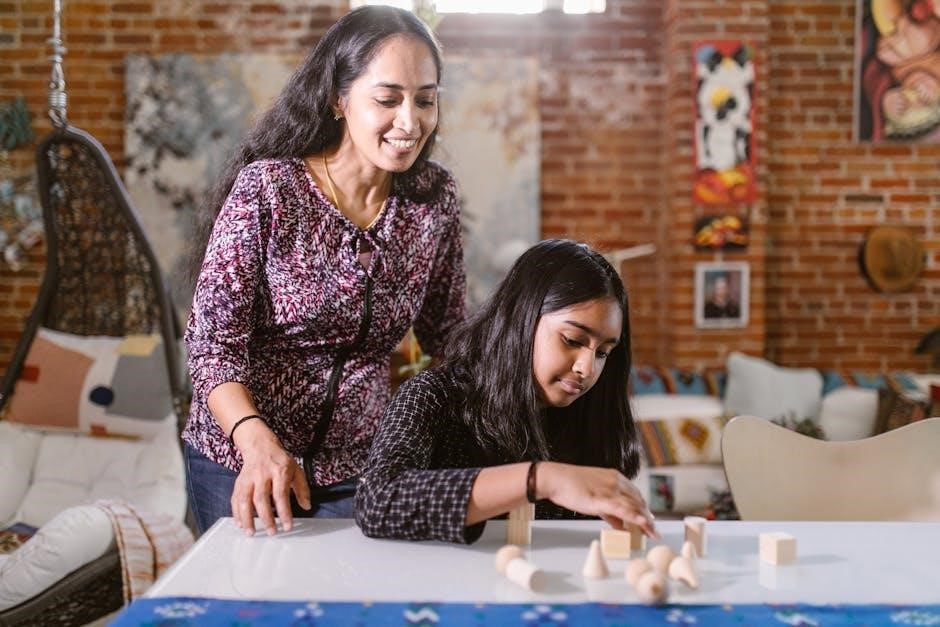Happiness isn’t just fleeting emotion; it’s a trainable skill; Like riding a bike, it requires effort. Developing happiness means training your mind, cultivating resilience, and building positive relationships to navigate lifes challenges effectively.
Defining Happiness as a Skill
Defining happiness as a skill shifts our perspective. It’s not merely chance but a cultivated ability. This skill involves training the mind to seek well-being independently. Happiness isn’t constant; it’s resilience, purpose, and well-being. Achieving it requires sustained effort.
Developing happiness skills allows us to navigate circumstances effectively. Key components include self-awareness, emotional regulation, and supportive relationships. These overlap, aiding and supporting each other.
Building happiness is learning and developing skills that increase success and help achieve goals. It’s about adaptive behavior to cope with life’s challenges. It’s a molecular biologist and Buddhist monk demonstrating inner conditions for true happiness.
Ultimately, happiness is a skill we develop. We can handle any circumstance positively. It’s an ongoing journey of self-development.
The Importance of Planning for Happiness
Planning for happiness is essential because it doesn’t happen by chance. Many talk about happiness, but defining it precisely is hard. It requires conscious effort and a strategic approach.
A happiness plan involves clarifying why you want a happy life and when to build related skills. It also means deciding which specific happiness skills to develop. It is making your happiness number one priority.
To create a happiness plan, it means taking action and doing what makes you happy. It also means developing a growth mindset that focuses on your ability to create a happy life.
By planning, we recognize that happiness is a tangible goal. This plan provides direction and purpose. It also helps you discover that you can deal with any circumstance in the best possible way.
Essential Skills for a Happy Life
Essential skills for a happy life aren’t extraordinary talents. They are training your mind to independently seek well-being. Everyone is different, and there are no wrong answers, so you can add more skills.
These skills help us develop adaptive behavior to cope with challenges. These life skills help us increase our chances of success and achieving our goals. The mental well-being of people shows how positively and adaptively they behave.
These skills help us interact with others, with their cultures, and with their environments. Also, these skills contribute to your happiness. These skills overlap, with each aiding and supporting the others.
With the right skills, we find flow, achieve goals, and build a meaningful life. Developing life skills is key not only to being successful in life. It’s also key for our health and well-being.
Self-Awareness
Self-awareness is the ability to attend to and acknowledge thoughts and emotions. Self-awareness is a crucial skill for a happy life. It involves understanding your values, beliefs, strengths, and weaknesses.
Increasing self-awareness will help you to understand yourself and others better. When we understand ourselves, we can make better choices. Self-awareness is the foundation for emotional regulation and building supportive relationships.
Self-awareness helps you recognize your emotional triggers and patterns. It helps you to understand how your emotions impact your behavior. It helps you understand how your emotions impact your relationships.
By practicing self-awareness, you gain insights into your needs and desires. This insight allows you to align your actions with your authentic self. This alignment fosters a sense of purpose and fulfillment.
Therefore, self-awareness is the cornerstone of a happy life. This is because it empowers you to navigate life with intention and authenticity.
Emotional Regulation
Emotional regulation is a key skill for a happy and healthy life. It is the ability to manage and respond to emotions effectively. It involves understanding your emotions, accepting them, and choosing how to express them.
When you can regulate your emotions, you’re better equipped to handle stress and challenges. Emotional regulation is the ability to stay calm and focused. It helps you to maintain positive relationships and achieve your goals.

Developing emotional regulation skills involves learning to identify your triggers. It also involves developing strategies for managing difficult emotions. Techniques like deep breathing, mindfulness, and cognitive reappraisal can be helpful.
Emotional regulation isn’t about suppressing or avoiding emotions. It’s about understanding and accepting them. It’s about choosing how to respond in a healthy and constructive way.
Mastering emotional regulation can lead to greater well-being. This is because it equips you with tools to navigate life’s ups and downs with resilience and grace.
Building Supportive Relationships
Building supportive relationships is an important aspect of a happy life. Humans are social beings. Supportive relationships provide us with a sense of belonging, security, and love. These connections contribute significantly to our overall well-being.
Supportive relationships are characterized by trust, empathy, and mutual respect. They are relationships where you feel safe. Safe enough to be yourself and where you can share your thoughts and feelings without judgment.

To build supportive relationships, it is important to be a good friend, family member, or partner. This includes being a good listener, offering support and encouragement. It is also important to be honest and reliable.
Nurturing existing relationships and seeking out new connections is essential. Joining clubs, volunteering, or participating in social activities can help.
Building supportive relationships takes time and effort. The benefits of strong social connections are immeasurable. These connections contribute to a happier, healthier, and more fulfilling life.
Cultivating Resilience
Cultivating resilience is an indispensable skill for navigating life’s inevitable challenges and setbacks. Resilience is not about avoiding difficulties. It is about bouncing back from adversity with strength and adaptability. It is the ability to recover quickly from difficulties.
Developing resilience involves adopting a growth mindset, where challenges are seen as opportunities for learning and personal growth. This perspective helps reframe negative experiences into valuable lessons. It allows one to develop coping mechanisms.

Self-awareness plays a crucial role in cultivating resilience. Recognizing and understanding your emotions, strengths, and limitations enables you to respond effectively to stressful situations.
Resilience is also fostered through building strong support networks. Supportive relationships provide a buffer against stress and offer encouragement during tough times.
Practicing self-care, such as mindfulness and physical exercise, is essential for maintaining emotional and physical well-being. These practices help manage stress and promote a sense of inner peace.
Mindfulness and Meditation
Mindfulness and meditation are powerful practices for cultivating inner peace and enhancing overall well-being. Mindfulness involves paying attention to the present moment without judgment, while meditation is a technique to train your mind to focus and redirect thoughts.

These practices help reduce stress and anxiety by promoting a sense of calm and clarity. Regular meditation can improve emotional regulation and increase self-awareness.
By focusing on the present, you can break free from dwelling on the past or worrying about the future. This present moment awareness allows you to appreciate the simple joys of life.
Mindfulness meditation can be practiced anywhere, anytime. Start with a few minutes each day and gradually increase the duration as you become more comfortable.
There are various forms of meditation, including breath awareness, body scan, and loving-kindness meditation. Experiment with different techniques to find what resonates with you.
Mindfulness and meditation are not about emptying your mind but about observing your thoughts and emotions without getting carried away. They help you develop a non-judgmental attitude towards yourself and others.
Developing a Growth Mindset
Cultivating a growth mindset is crucial for enhancing happiness and resilience. This perspective emphasizes that abilities and intelligence are not fixed but can be developed through dedication and hard work. Embracing challenges and viewing failures as opportunities for growth is central to this mindset.
Instead of avoiding difficult tasks, individuals with a growth mindset actively seek them out, recognizing that they foster learning and development. They persist in the face of setbacks, viewing them as temporary obstacles rather than permanent limitations. This resilience contributes significantly to overall well-being.
Adopting a growth mindset involves reframing negative self-talk and replacing it with positive affirmations. Celebrating small victories and focusing on progress rather than perfection are also key components.
By believing in your capacity to learn and improve, you unlock your potential and enhance your sense of self-efficacy. This empowerment leads to greater satisfaction and a more fulfilling life.
The growth mindset fosters a love of learning and a continuous pursuit of self-improvement, which are essential elements of happiness.
The Role of Purpose and Meaning
Identifying and pursuing a sense of purpose and meaning is fundamentally important for fostering lasting happiness and well-being. A life filled with purpose transcends fleeting pleasures, providing a deeper sense of fulfillment and direction.
Engaging in activities that align with your values and passions ignites a sense of meaning, making daily life more engaging and satisfying. This could involve volunteering, creative pursuits, or contributing to a cause you believe in.
Discovering your purpose often involves introspection and exploration. Reflecting on your strengths, interests, and values can help you identify areas where you can make a meaningful impact. Setting goals that align with your purpose provides a roadmap for personal growth and achievement.
Embracing a life of purpose also enhances resilience in the face of adversity. When challenges arise, a strong sense of meaning provides a foundation of strength and motivation to persevere.
Cultivating purpose and meaning is an ongoing journey. By aligning your actions with your values and contributing to something larger than yourself, you create a life filled with joy, fulfillment, and enduring happiness.
Extending Happiness to Others
Extending happiness to others is a powerful way to amplify your own joy and create a more positive world. Acts of kindness, compassion, and generosity not only benefit the recipients but also enhance the well-being of the giver.
Helping others can take many forms, from volunteering your time to offering a listening ear to someone in need. Small gestures of kindness, such as a compliment or a helping hand, can brighten someone’s day and create a ripple effect of positivity.
Building supportive relationships and fostering a sense of community are essential aspects of extending happiness. Connecting with others, sharing experiences, and offering support strengthens social bonds and creates a sense of belonging.
Practicing empathy and understanding the perspectives of others can also foster compassion and kindness. By recognizing the shared humanity in all people, we can cultivate a desire to alleviate suffering and promote well-being.
Extending happiness is not just about grand gestures; it’s about incorporating kindness into our daily interactions. By choosing to be a source of positivity and support for those around us, we create a more joyful and fulfilling life for ourselves and others.

